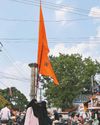Thoroughly liveried, the judge comes across as a maharaja. A time-warp cloaks Indian judiciary’s etiquette.

Every day, courts across India begin proceedings at 10.30 am when an usher in a crisp white uniform, and in some places a turban, holds open the door. It is then that the waiting lawyers, litigants and others stand up and, after a very brief pause, the judge (or judges) walks in. An attendant holds the chair till the judge sits down…more than one of them, if it’s judges.
This ceremonial seating begins the gruelling day for high court or Supreme Court judges who have to traverse through reams of paperwork and scores of ‘milording’ advocates. As lunch hour or 4 pm draws closer, waiting lawyers keep one eye on the clock and the other on the usher. When the attendant reaches for the judge’s chair from the back, it’s the sign that his lordship will now rise and retire from the open court.
Everything about that scene—the unevenly distributed privilege, the visual cues, the obeisant forms of address—is straight out of a pre-modern protocol, a feudal code. Its survival into modern contexts was seen to have served a function—ennobling the idea of justice and its arbiters, granting them a safe distance from the mundane, conferring on them the right to the last word.
In India, though, the risk of all this being read in terms of older forms of privilege is never too far. Ushers are part of the small, visible tokens reserved for India’s higher judiciary. (One argument advanced in its defence is that it creates jobs, though in economics there also exists the concept of disguised unemployment.) There are other privileges, both seen and unseen. In the latter category are protocol officers at airports. Their job is to help judges, both serving and retired, past airport security as well as run other errands.
هذه القصة مأخوذة من طبعة April 10, 2017 من Outlook.
ابدأ النسخة التجريبية المجانية من Magzter GOLD لمدة 7 أيام للوصول إلى آلاف القصص المتميزة المنسقة وأكثر من 9,000 مجلة وصحيفة.
بالفعل مشترك ? تسجيل الدخول
هذه القصة مأخوذة من طبعة April 10, 2017 من Outlook.
ابدأ النسخة التجريبية المجانية من Magzter GOLD لمدة 7 أيام للوصول إلى آلاف القصص المتميزة المنسقة وأكثر من 9,000 مجلة وصحيفة.
بالفعل مشترك? تسجيل الدخول

Trump's White House 'Waapsi'
Donald Trump's victory in the US presidential election may very well mean an end to democracy in the near future

IMT Ghaziabad hosted its Annual Convocation Ceremony for the Class of 2024
Shri Suresh Narayanan, Chairman Managing Director of Nestlé India Limited, congratulated and motivated graduates at IMT Ghaziabad's Convocation 2024

Identity and 'Infiltrators'
The Jharkhand Assembly election has emerged as a high-stakes political contest, with the battle for power intensifying between key players in the state.

Beyond Deadlines
Bibek Debroy could engage with even those who were not aligned with his politics or economics

Portraying Absence
Exhibits at a group art show in Kolkata examine existence in the absence

Of Rivers, Jungles and Mountains
In Adivasi poetry, everything breathes, everything is alive and nothing is inferior to humans

Hemant Versus Himanta
Himanta Biswa Sarma brings his hate bandwagon to Jharkhand to rattle Hemant Soren’s tribal identity politics

A Smouldering Wasteland
As Jharkhand goes to the polls, people living in and around Jharia coalfield have just one request for the administration—a life free from smoke, fear and danger for their children

Search for a Narrative
By demanding a separate Sarna Code for the tribals, Hemant Soren has offered the larger issue of tribal identity before the voters

The Historic Bonhomie
While the BJP Is trying to invoke the trope of Bangladeshi infiltrators”, the ground reality paints a different picture pertaining to the historical significance of Muslim-Adivasi camaraderie